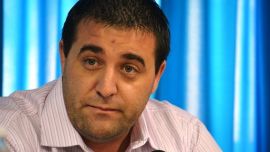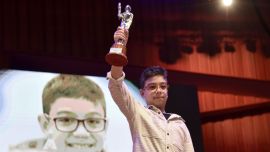The outgoing government officially confirmed this week what seemed evident since the morning of October 28, when President Mauricio Macri hosted his successor Alberto Fernández for coffee at Government House: no transition work is taking place.
“For some reason the transition did not go on,” said Defence Minister Oscar Aguad after a Cabinet meeting this week. “If we have nobody to whom to explain the state of affairs, we’ll just leave the papers on the table when we leave.”
It is not clear if the incoming president will have time to read them when he takes office on December 10. But another type of transition – a paperless one – is actually taking place.
Up until now, Fernández spent most of the first two weeks after his election win on international affairs. First, he travelled to Mexico, an odd choice for an initial foreign trip given the country’s thin trade relationship with a country whose foreign policy looks north rather than south. Then he sailed across the River Plate to Montevideo, to endorse Uruguay’s ruling party candidate Daniel Martínez in his uphill battle to turn around a likely defeat against the centre-rightist candidate, Luis Lacalle Pou, tomorrow. In between, Fernández denounced the forced resignation of Bolivia’s Evo Morales as a coup d’état.
But now that the clock is ticking faster toward the changing of the guards, Fernández has decided to drop his foreign agenda to focus on speeding up the musical chairs that define his first Cabinet. An announced pre-inauguration trip to Europe, likely touching down in France, Italy, Holland and possibly Germany, has been called off over difficulties in hammering out a meaningful agenda.
Suddenly an avalanche of open fronts is looming on him. One of these is internal – on Monday evening the president-elect met with his future vice-president, Cristina Fernández de Kirchner, for the first time since the election. The former head of state had been in Cuba visiting her daughter Florencia, who is undergoing medical treatment. The general suspicion is that Fernández de Kirchner might want to exert greater influence over Fernández’s administration than the markets would prefer, and the symbol of the president-elect calling on the vice-president-elect – instead of vice versa– only fuels that notion.
Fernández de Kirchner is also trying to tighten her grip on Congress. As vice-president, she will preside over the Senate. A move is underway to unite the future ruling party’s Senate caucus, which until now has remained divided between Kirchneristas and Peronistas. Many governors want to keep it that way. The former president’s son, lawmaker Máximo Kirchner, is now earmarked to abandon his usual low-profile approach to head the ruling party caucus in the lower house Chamber of Deputies.
Fernández’s thinner than expected victory on October 27 – 8 points versus the 16 he won in the August PASO primaries – leaves the new President with less political leeway, especially in terms of distancing himself from Cristina, the main source of his political power. The president-elect’s foreign policy stances are directly related to that.
A day after meeting with Fernández de Kirchner, the president-elect did not call but received a call from Kristalina Georgieva, the new managing director of the International Monetary Fund. Only in the job for a handful of weeks, Georgieva is trying to figure out how she will handle the relationship with the IMF’s unpredictable top debtor. Before talking to Fernández, Georgieva talked to Bloomberg and said that “the [Fernández] government has to figure out a way to live within its budgetary constraints.” On the phone, Fernández told her that this will not be immediately possible. “We can’t do more spending cuts because the situation is enormously complex,” he reportedly said.
According to Fernández, he told the IMF chief that his future government “has developed a sustainable plan that will allow
us to grow and comply with our obligations that Argentina has
with you and with the rest of the creditors.” No Argentine has
seen that plan just yet, and those musical chairs and the top
ministerial stops continue to grip the headlines.related news





















Comments